

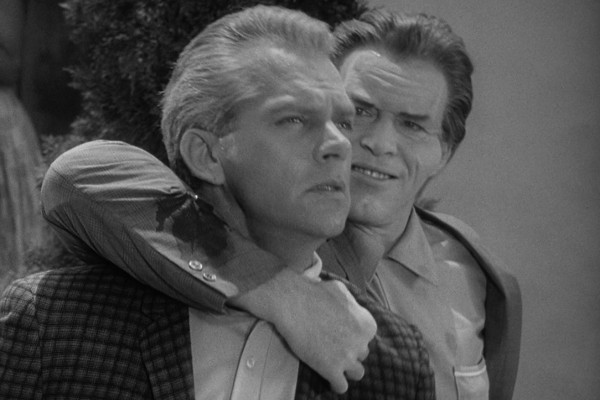
It says a lot about the quality of season two that this episode is one of the best. Gerd Oswald, the series' finest director, admitted he only took the script on because there was nothing else ready, and did what he could with the available material.
It's not that the script is bad, or even beyond redemption. In fact, the idea of the Jekyll and Hyde story being reworked as the byproduct of mind-expanding drugs is very inspired, and there are some nice dialogue sequences. It also features a role for James Doohan, who manages to make a more positive impression than either Nimoy or Shatner in their Outer Limits appearances.
But other sequences are methodically slow, the budget is inadequate for the material, and it never really goes anywhere it shouldn't. In many senses, Expanding Human is the biggest wasted opportunity of the season.
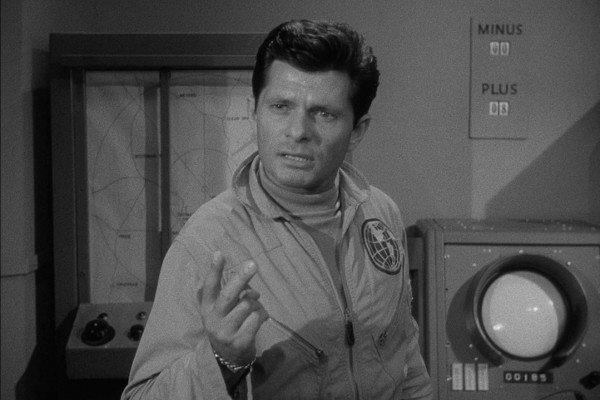
My attention was first drawn to The Premonition after my Worst To Best article on UFO, where it was pointed out to me that the episode I rated top, Timelash, had plot similarities to this one. It's undeniable, the story of a man and woman exploring time inside a "millionth of a second" is an innovation that may not be entirely coincidental. But whereas UFO pulled this off with wit, verve and style, The Premonition makes the viewer feel, ironically, that time has been slowed almost to a standstill.
Featuring two actors who had both appeared in Humphrey Bogart's The Desperate Hours, they're two of the most wooden performers in the entire run, and the young girl playing their daughter is, God bless her, a chip off the old block. Horribly padded to last 50 minutes, the worst scene is where a hammy old luvvie explains to the couple how he wants to get away from being trapped in time but can only do so if he steals their place... while simultaneously telling them exactly how to escape. When they return to normal time, is he still around, watching them from a speeded-up perspective? The script never seems to care and neither should you... first class idea, third-rate execution.
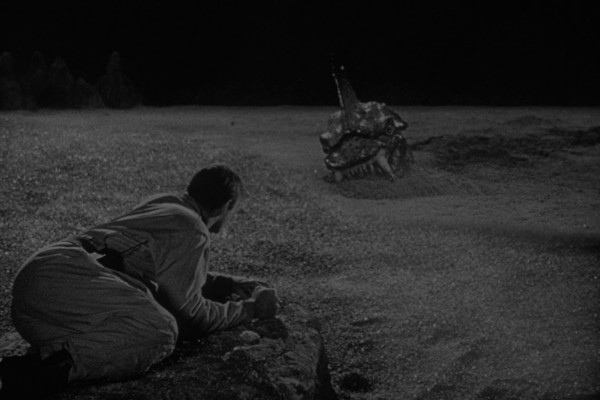
Shallow, silly (albeit watchable) nonsense with Adam West leading an expedition to Mars amongst sand shark monsters. Writer Jerry Sohl had been behind a few semi-classic Twilight Zone episodes as a ghost writer for Charles Beaumont (Queen of the Nile/Living Doll/The New Exhibit) but what he produces here is pure pulp. It's fun, and diverting, but ultimately light-weight... what was once an intelligent SF series dumbed down into Boy's Own theatrics. Although season two was axed after producing just over half the number of episodes that the first season managed, the high rating of this one says a lot. Sure, there's less to choose from, but here The Invisible Enemy makes it in comfortably as the sixth best episode they did... put it amongst season one and it'd be lucky if it made top twenty.
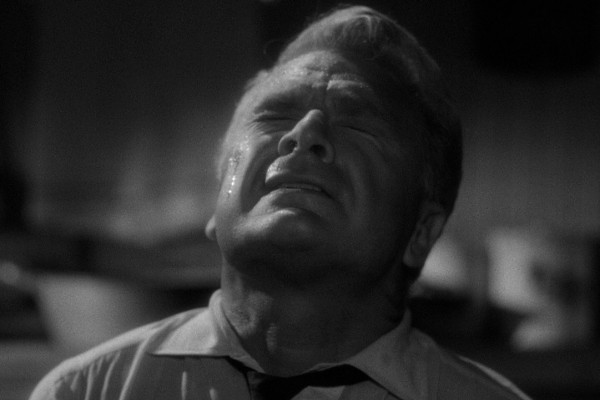
"Anybody with six drinks in 'em could write this kind of junk!"
Any piece of film or television is reliant upon the viewer's suspension of disbelief and their ability to "buy in" to the situations. This one opens with some awfully staged and unintentionally hilarious killer tumbleweed attacks and adds some rubber frogs to the mix. And, as earnest as the two lead actors are, there are times when it appears Eddie Albert is stretched beyond his means, and June Havoc, while fine, is playing a different character in almost every scene. All this is to say nothing of Arthur Hunnicutt making a mockery of his earlier nomination for an Academy Award.
And yet... switch the lights off, buy into the situation completely and it's really quite scary, if you allow it to be. Inanimate objects coming to life isn't really the most terrifying thing to man, especially on this budget, but the writer seems to realise this and introduces the element of an untrustworthy human with psychological problems, man being the most dangerous creature of all.
It's perhaps not as developed as it could be, and Stefano would never have given a semi-happy ending, a weakness with so many season two stories. But look at the similarities between this and the later Night of the Living Dead, and, with some indulgence from the audience, this episode can be something fairly special.
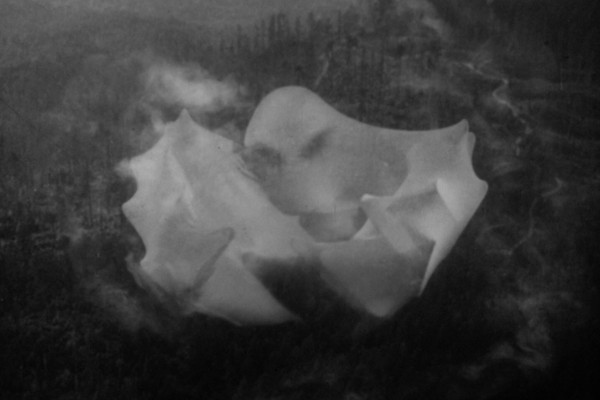
This one has a fascinating concept - a planet from eight light years away is recreated in miniature in a lab, with scientists observing its speeded-up evolution under a microscope. With one second of Earth time equalling 11.5 days on the alien world, it's not long before we see the world's future (after a rare touch of season one obsession nuclear war) and the frightening secrets the planet holds.
It's not perfect. The alien is clearly just a glove puppet, albeit shot quite well, there's huge chunks of exposition throughout and, as with the majority of season two stories, the central characters aren't neurotics or oddballs, but another happy, loving couple, if likeable.
Yet this one has a compulsion and drive that the vast majority of season two stories don't. More to the point, while seemingly inspired by SF literature, with its musings on the nature of mankind and our own planet's future, it's a season two story that actually has something to say.

When people talk about season two of The Outer Limits, two things come to the forefront more than any other - the noir lighting is discarded, and Harlon Ellison won a successful lawsuit over his two episodes bearing a similarity to The Terminator.
However, it's not quite true, as Ellison settled out of court, so it never went to lawsuit, and he was always complimentary about The Terminator, noting in June 2013 to The Guardian newspaper that the quality of a product can affect whether he decides to take out a lawsuit: "let this movie [In Time] fall into complete obscurity, and the universe forget it, and don't attach my name to it, the way they did The Terminator, which is a good film."
Not only this, but the quoted James Cameron quote where he claimed to have stolen from "a couple of Outer Limits episodes" isn't specific to Ellison's scripts, and more likely referenced season one's The Man Who Was Never Born (by Anthony Lawrence) than Ellison's other script, Demon With a Glass Hand. Despitee all this, similarities do appear superficial, Cameron regarded it as a "nuisance suit", and, when all said and done, when he talked about stealing from the show, it's possible he was just joking.
The lighting remark is certainly apt... Kenneth Peach's flatter, more conventional methods mean things definitely look cheaper and studio sets look like... studio sets. However, this one manages to compensate for such technical shortcomings with a pacey (for the time) plot, propelled by Lloyd Nolan's energetic performance, even though he, like June Havoc in Cry Of Silence, appears to be playing a different character in almost every scene.
The ending appears rushed and unfocussed, but the top three or four episodes of season two are in a different class to the rest.
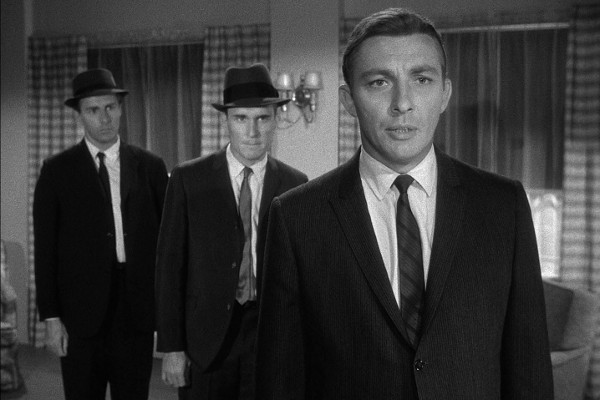
The Outers Limits in one of its most ambitious projects, with a globe-spanning two-parter that collectively runs for over 98 minutes on original footage alone. A collective alien intelligence affects the minds of four separate men, and we're led to wonder what the intelligence wants, and why it's forcing them to kidnap children.
As Robert Duvall leads the investigation, the sinister undercurrent of such a plot is not gone unreferenced in one of the programme's most adult stories: "It used to be candy, or a ride in a car. 'Your mother's sick, get in and I'll drive you home'." Such moments do help to counterbalance the arguably syruppy - yet affecting - ending, coupled with a moral choice that offsets the cheapness of the "rocket". One thing that may surprise modern viewers is how old-fashioned the incidental music in the programme is, and The Inheritors is certainly no exception to the big brass band style of accompaniment.
While Duvall is expectedly good, the rest of the guest cast are equally strong here: it's hard to believe that Steve Ihnat, as the leader of the possessed men, was only just out of his 20s when it was shot. (And sadly passed away less than eight years later). He's far from alone, with Ivan Dixon in particular delivering solid support. Perhaps the only question left hanging is whether the kids' parents had any say in matters... the episode was loosely remade as part of the colour series in 1999.
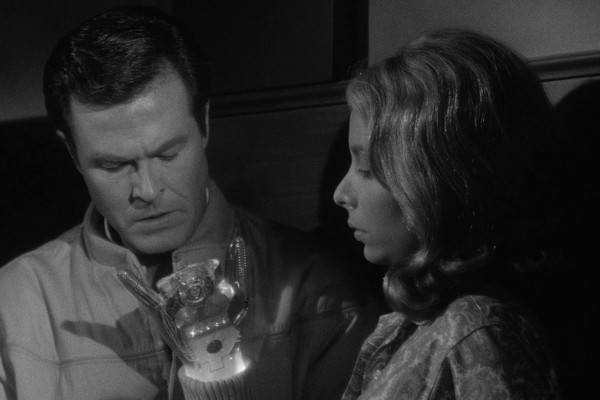
It's a shame that Demon With A Glass Hand is an episode that can't be referenced without an obligatory mention of two other SF properties: yes, the same building, brilliantly used here, was also used in Blade Runner, a film with which it has arguable plot similarities. There's also the long-standing myth (to my shame, originally repeated in this article) that it was part of the threatened Harlan Ellison lawsuit over The Terminator. It wasn't.
But while such things perhaps command more attention than the episode itself, what is maybe most surprising is the other people behind it: Byron Haskin isn't a terrible director, but his other season two entries Behold Eck! and The Invisible Enemy weren't really going to set the world on fire. And where did Kenneth Peach - The Outer Limits' blandest, flattest cinematographer - pull all that noir lighting from? A perfect mash-up of 30s hardboiled detective tale and high concept SF that's so adult it even takes in domestic abuse.
Such themes make it easy to overlook the total ineptitude of the panda-eyed villains, or the multiple layers of exposition: Robert Culp gaining plot info from interrogation of the panda villains; then from the glass hand of the title; then a single-shot gumshoe style voice-over, further muddied by the "Transmission Control" voiceover, delivering another of season two's far more pretentious and laboured narratives. In awarding Demon With A Glass Hand the top spot of The Outer Limits' second season (and maybe the top spot of all 49 episodes) it's almost ungratifying to repeat "accepted wisdom"... but this one really is that good.